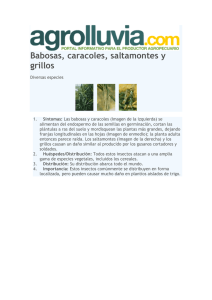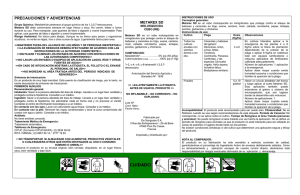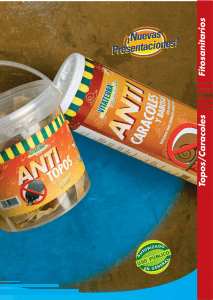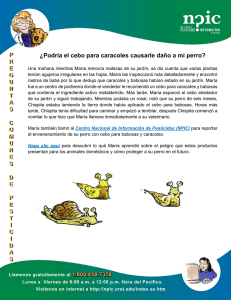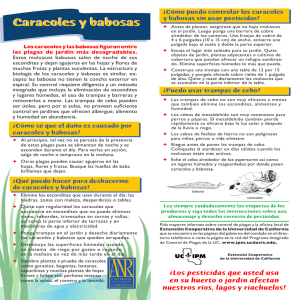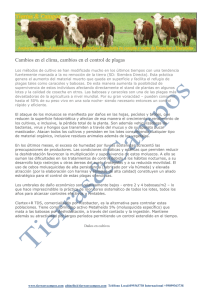CAUTION
Anuncio
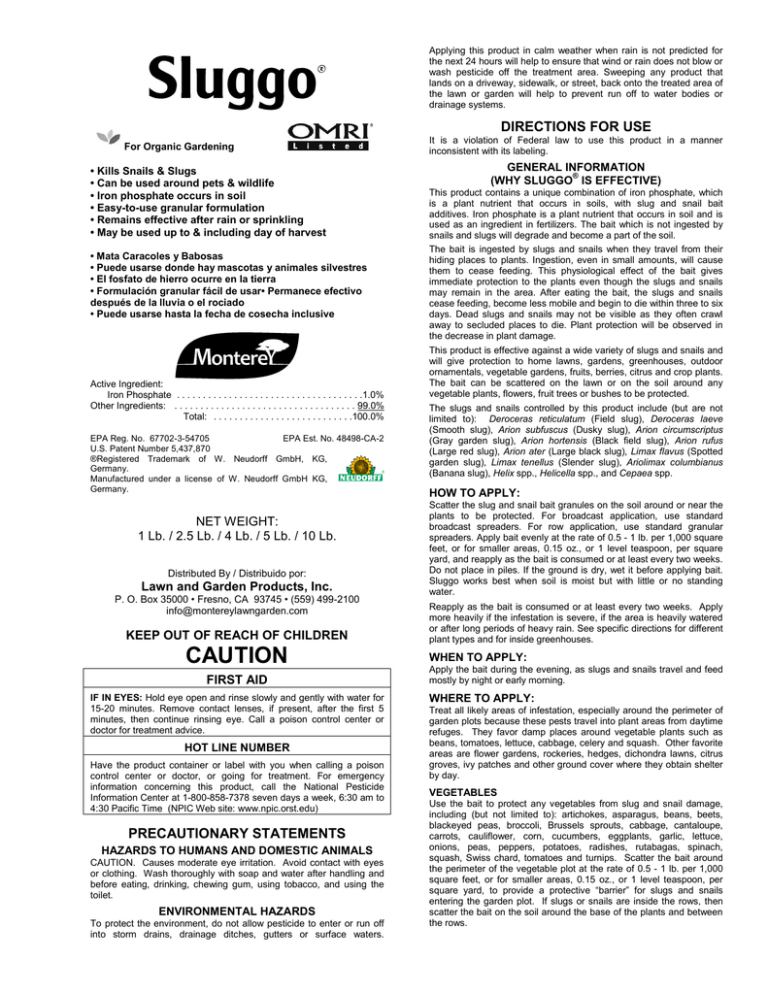
® Applying this product in calm weather when rain is not predicted for the next 24 hours will help to ensure that wind or rain does not blow or wash pesticide off the treatment area. Sweeping any product that lands on a driveway, sidewalk, or street, back onto the treated area of the lawn or garden will help to prevent run off to water bodies or drainage systems. DIRECTIONS FOR USE For Organic Gardening • Kills Snails & Slugs • Can be used around pets & wildlife • Iron phosphate occurs in soil • Easy-to-use granular formulation • Remains effective after rain or sprinkling • May be used up to & including day of harvest • Mata Caracoles y Babosas • Puede usarse donde hay mascotas y animales silvestres • El fosfato de hierro ocurre en la tierra • Formulación granular fácil de usar• Permanece efectivo después de la lluvia o el rociado • Puede usarse hasta la fecha de cosecha inclusive Active Ingredient: Iron Phosphate . . . . . . . . . . . . . . . . . . . . . . . . . . . . . . . . . . . .1.0% Other Ingredients: . . . . . . . . . . . . . . . . . . . . . . . . . . . . . . . . . . . 99.0% Total: . . . . . . . . . . . . . . . . . . . . . . . . . . .100.0% EPA Reg. No. 67702-3-54705 EPA Est. No. 48498-CA-2 U.S. Patent Number 5,437,870 ®Registered Trademark of W. Neudorff GmbH, KG, Germany. Manufactured under a license of W. Neudorff GmbH KG, Germany. NET WEIGHT: 1 Lb. / 2.5 Lb. / 4 Lb. / 5 Lb. / 10 Lb. Distributed By / Distribuido por: Lawn and Garden Products, Inc. P. O. Box 35000 • Fresno, CA 93745 • (559) 499-2100 [email protected] KEEP OUT OF REACH OF CHILDREN CAUTION FIRST AID IF IN EYES: Hold eye open and rinse slowly and gently with water for 15-20 minutes. Remove contact lenses, if present, after the first 5 minutes, then continue rinsing eye. Call a poison control center or doctor for treatment advice. HOT LINE NUMBER Have the product container or label with you when calling a poison control center or doctor, or going for treatment. For emergency information concerning this product, call the National Pesticide Information Center at 1-800-858-7378 seven days a week, 6:30 am to 4:30 Pacific Time (NPIC Web site: www.npic.orst.edu) PRECAUTIONARY STATEMENTS HAZARDS TO HUMANS AND DOMESTIC ANIMALS CAUTION. Causes moderate eye irritation. Avoid contact with eyes or clothing. Wash thoroughly with soap and water after handling and before eating, drinking, chewing gum, using tobacco, and using the toilet. ENVIRONMENTAL HAZARDS To protect the environment, do not allow pesticide to enter or run off into storm drains, drainage ditches, gutters or surface waters. It is a violation of Federal law to use this product in a manner inconsistent with its labeling. GENERAL INFORMATION ® (WHY SLUGGO IS EFFECTIVE) This product contains a unique combination of iron phosphate, which is a plant nutrient that occurs in soils, with slug and snail bait additives. Iron phosphate is a plant nutrient that occurs in soil and is used as an ingredient in fertilizers. The bait which is not ingested by snails and slugs will degrade and become a part of the soil. The bait is ingested by slugs and snails when they travel from their hiding places to plants. Ingestion, even in small amounts, will cause them to cease feeding. This physiological effect of the bait gives immediate protection to the plants even though the slugs and snails may remain in the area. After eating the bait, the slugs and snails cease feeding, become less mobile and begin to die within three to six days. Dead slugs and snails may not be visible as they often crawl away to secluded places to die. Plant protection will be observed in the decrease in plant damage. This product is effective against a wide variety of slugs and snails and will give protection to home lawns, gardens, greenhouses, outdoor ornamentals, vegetable gardens, fruits, berries, citrus and crop plants. The bait can be scattered on the lawn or on the soil around any vegetable plants, flowers, fruit trees or bushes to be protected. The slugs and snails controlled by this product include (but are not limited to): Deroceras reticulatum (Field slug), Deroceras laeve (Smooth slug), Arion subfuscus (Dusky slug), Arion circumscriptus (Gray garden slug), Arion hortensis (Black field slug), Arion rufus (Large red slug), Arion ater (Large black slug), Limax flavus (Spotted garden slug), Limax tenellus (Slender slug), Ariolimax columbianus (Banana slug), Helix spp., Helicella spp., and Cepaea spp. HOW TO APPLY: Scatter the slug and snail bait granules on the soil around or near the plants to be protected. For broadcast application, use standard broadcast spreaders. For row application, use standard granular spreaders. Apply bait evenly at the rate of 0.5 - 1 lb. per 1,000 square feet, or for smaller areas, 0.15 oz., or 1 level teaspoon, per square yard, and reapply as the bait is consumed or at least every two weeks. Do not place in piles. If the ground is dry, wet it before applying bait. Sluggo works best when soil is moist but with little or no standing water. Reapply as the bait is consumed or at least every two weeks. Apply more heavily if the infestation is severe, if the area is heavily watered or after long periods of heavy rain. See specific directions for different plant types and for inside greenhouses. WHEN TO APPLY: Apply the bait during the evening, as slugs and snails travel and feed mostly by night or early morning. WHERE TO APPLY: Treat all likely areas of infestation, especially around the perimeter of garden plots because these pests travel into plant areas from daytime refuges. They favor damp places around vegetable plants such as beans, tomatoes, lettuce, cabbage, celery and squash. Other favorite areas are flower gardens, rockeries, hedges, dichondra lawns, citrus groves, ivy patches and other ground cover where they obtain shelter by day. VEGETABLES Use the bait to protect any vegetables from slug and snail damage, including (but not limited to): artichokes, asparagus, beans, beets, blackeyed peas, broccoli, Brussels sprouts, cabbage, cantaloupe, carrots, cauliflower, corn, cucumbers, eggplants, garlic, lettuce, onions, peas, peppers, potatoes, radishes, rutabagas, spinach, squash, Swiss chard, tomatoes and turnips. Scatter the bait around the perimeter of the vegetable plot at the rate of 0.5 - 1 lb. per 1,000 square feet, or for smaller areas, 0.15 oz., or 1 level teaspoon, per square yard, to provide a protective “barrier” for slugs and snails entering the garden plot. If slugs or snails are inside the rows, then scatter the bait on the soil around the base of the plants and between the rows. FRUITS Including Citrus Use the bait to protect fruits from slugs and snails, including (but not limited to): apples, avocados, apricots, cherries, grapes, melons, peaches, plums, citrus, pears. For seedlings, spread the bait around the base of the stem. Apply at 0.15 oz., or 1 level teaspoon, per square yard, in a 6-inch circular band around the base of the plants to be protected. For older trees, spread the bait around the base of the tree to intercept slugs and snails traveling to the trunk. Apply the bait at the rate of 0.5 - 1 lb. per 1,000 square feet for orchards using standard fertilizer granular spreaders. BERRIES Use the bait to protect berries from slugs and snails, including (but not limited to): strawberries, blackberries, blueberries, boysenberries, loganberries, raspberries. Spread the bait around the perimeter of the plot to intercept slugs and snails migrating toward the berries. Use a rate of 0.5 - 1 lb. per 1,000 square feet, or for smaller areas, 0.15 oz., or 1 level teaspoon, per square yard, and scatter by hand or with granular spreaders. If slugs and snails are already in the plots, then carefully spread bait between the furrows near the base of the plants. For small plots, treat around the base of the plants to be protected. Do not spread over the entire area, but apply selectively. OUTDOOR ORNAMENTALS Scatter bait in a 6-inch circular band around the base of the plants to be protected at 0.15 oz., or 1 level teaspoon, per square yard. If plants are next to a grassy area, spread the bait between the ornamentals and the grass. Slugs and snails traveling to the plants will encounter the bait before reaching the plant. In these situations, scatter the bait around the perimeter of the plot at the rate of 1 lb. per 1,000 square feet to intercept snails and slugs traveling to the plot. GREENHOUSES Where slugs or snails are a problem in greenhouses, scatter the bait in the plant pots of plants being damaged or around pots on greenhouse benches. Apply about 1/2 teaspoon per 9-inch pot. LAWNS Use the bait on lawns as a buffer zone around gardens. When slugs or snails are detected, scatter the bait at a rate of 0.15 oz., or 1 level teaspoon, per square yard. Scatter by hand or with a granular spreader where the slugs or snails are observed. MANTENGA FUERA DEL ALCANCE DE LOS NIÑOS PRECAUCIÓN PRIMEROS AUXILIOS SI LE CAE EN LOS OJOS: Sostenga los ojos abiertos y lave lenta y suavemente con agua por 15 a 20 minutos. Quítese los lentes de contacto, si los usa, después de los primeros 5 minutos, luego siga lavándose los ojos. Llame a un centro intoxicaciones o al médico para obtener consejos de tratamiento. NÚMERO DE LÍNEA DIRECTA Tenga a mano el recipiente o etiqueta del producto al llamar al centro intoxicaciones o al médico o al solicitar tratamiento. Para obtener información de emergencia sobre este producto, llame al Centro Nacional de Información de Pesticidas al 1-800-858-7378, siete días a la semana, de las 6:30 AM a 4:30 PM Hora del Pacífico (Sitio en la Web del NPIC: www.npic.orst.edu) DECLARACIONES PREVENTIVAS RIESGOS PARA LAS PERSONAS Y LOS ANIMALES DOMÉSTICOS PRECAUCIÓN. Causa irritación de los ojos. Evite el contacto con los ojos o la ropa. Lávese a fondo con jabón y agua después de manipular el producto y antes de comer, mascar chicle, beber o fumar y utilizar los servicios sanitarios. RIESGOS AMBIENTALES Para proteger el ambiente, no permita que los pesticidas ingresen o chorreen a las alcantarillas, a las cunetas, canalones, o aguas superficiales. La aplicación de este producto en tiempo tranquilo, cuando no se pronostica la lluvia por las próximas 24 horas ayudará a asegurar que ni el viento ni la lluvia soplen ni laven el pesticida fuera del área de tratamiento. El barrer cualquier cantidad de producto que caiga en un camino privado de la casa, en una acera o en la calle hacia el área tratada del césped o jardín ayudará a evitar que el producto fluya a masas de agua o sistemas de drenaje. INSTRUCCIONES PARA EL USO STORAGE AND DISPOSAL Do not contaminate water, food or feed by storage or disposal. Pesticide Storage: Store this product in its original container and keep in a secure storage area out of reach of children and domestic animals. Container Disposal: Nonrefillable container. If empty: Do not reuse or refill this container. Offer for recycling, if available. If partly filled: Call your local solid waste agency for disposal instructions. Never place unused product down any indoor or outdoor drain. WARRANTY To the extent consistent with applicable law, the seller warrants that this product conforms to the chemical description on this label and is reasonably fit for purposes stated on this label only when used in accordance with directions for use. This warranty does not extend to use of this product contrary to label directions, or under abnormal use conditions, or under conditions not reasonably foreseeable to seller. To the extent consistent with applicable law, seller makes no other warranties, either express or implied. NOTE: This package is sold by weight. Contents may have settled during shipment. Usar de este producto inconsecuentemente con las instrucciones de su etiqueta viola la ley federal. INFORMACIÓN GENERAL (POR QUÉ SLUGGO® ES EFICAZ) Este producto contiene una combinación extraordinaria de fosfato de hierro, que es un alimento nutritivo de planta que ocurre en tierras, con posta y añadiduras de cebo para las babosas y caracoles. El fosfato del hierro es un alimento nutritivo de planta que ocurre en la tierra y es utilizado como un ingrediente en los abonos. El cebo que no es ingerido por los caracoles y babosas se degradará y se hará parte de la tierra. El cebo es ingerido por las babosas y caracoles cuando viajan de sus escondrijos a las plantas. La ingestión, aún en pequeñas cantidades, los hace cesar de comer. Este efecto fisiológico del cebo da protección inmediata a las plantas aunque las babosas y caracoles puedan permanecer en el área. Después de comer el cebo, las babosas y los caracoles cesan de comer, se hacen menos móviles y empiezan a morirse dentro de un lapso de tres a seis días. Las babosas y los caracoles muertos pueden no quedar visibles puesto que frecuentemente se arrastran a sitios apartados para morir. La protección a las plantas se observará en la disminución de los daños a las plantas. Este producto es efectivo contra una amplia variedad de babosas y caracoles y dará protección a céspedes domésticos, jardines, invernaderos, plantas ornamentales externas, huerta de vegetales, frutas, bayas, cítricos y cultivos. El cebo puede esparcirse sobre el césped o en la tierra alrededor de cualquier hortaliza, flores, frutales o arbustos a ser protegidos. Las babosas y caracoles controlados por este producto incluyen (pero no se limitan a):Deroceras reticulatum (babosa de campo), Deroceras laeve (babosa lisa), Arion subfuscus (babosa oscura), Arion circumscriptus (babosa gris de jardín), Arion hortensis (babosa negra de campo), Arion rufus (babosa roja grande), Arion ater (babosa negra grande), Limax flavus (babosa moteada de jardin), Limax tenellus (babosa delgada), Ariolimax columbianus (babosa de la banana), Helix spp., Helicella spp., y Cepaea spp. CÓMO APLICARLO Los gránulos de cebo para babosas y caracoles deben esparcirse sobre el suelo alrededor o cerca de las plantas que quieren protegerse. Para una dispersión amplia, se pueden utilizar esparcidores mecánicos. Para una dispersión por surcos, se pueden utilizar esparcidores granulares estándar. Aplique el cebo uniformemente a una tasa de 0.5 a 1 libra por 1,000 pies cuadrados, 0.15 onzas o una cucharadita rasa por yarda cuadrada, y reaplicar a medida que el cebo es consumido o por lo menos cada dos semanas. No coloque en pilas. Si la tierra está seca, mójela antes de aplicar el cebo. Sluggo funciona mejor cuando el suelo está húmedo, pero con poca o ninguna agua encharcada. Aplique nuevamente a medida que el cebo es consumido o por lo menos cada dos semanas. Aplique mayor cantidad si la infestación es grave, si es ha irrigado mucho el área o luego de largos periodos de lluvia. Consulte las instrucciones específicas para diferentes tipos de plantas y para invernaderos internos. CUÁNDO APLICARLO Aplique el cebo durante la noche temprana, puesto que las babosas y caracoles viajan y se alimentan principalmente de noche o temprano en la mañana. DÓNDE APLICARLO Trate todas las áreas probables de infestación, especialmente alrededor del perímetro de las eras porque estas plagas viajan a las áreas desde refugios diurnos. Favorecen los sitios húmedos alrededor de los vegetales como los frijoles, tomates, lechuga, repollo, apio españa y calabazas. Otras áreas favoritas son los lechos de flores, jardines de roca, los setos vivos, céspedes de dichondra, huertas de cítricos, parches de hiedra y otras cubiertas de suelo donde ellos obtienen refugio durante el día. HORTALIZAS El cebo puede utilizarse para proteger cualquier hortaliza del daño que hacen las babosas y caracoles, incluso (pero sin limitarse a): alcachofas, espárragos, frijoles, remolachas, fríjoles de ojos negros, brócoli, repollitos de Bruselas, repollo, melones, zanahorias, coliflor, maíz, pepinos, berenjenas, ajo, lechuga, cebollas, guisante, pimientos, papas, rábanos, nabo sueco, espinacas, calabazas, acelgas suizas, tomates y nabo. Disperse el cebo alrededor del perímetro del cuadro de vegetales a una tasa de media libra a una libra por 1000 pies cuadrados, o para áreas menores, 0.15 onzas, o una cucharada rasa por yarda cuadrada para crear una "barrera" protectora contra las babosas y caracoles que entran al cuadro del jardín. Si las babosas y caracoles están dentro de los surcos, entonces esparza el cebo sobre la tierra alrededor de la base de las plantas y entre los surcos. FRUTAS, los cítricos inclusive El cebo puede utilizarse para proteger a las frutas de las babosas y caracoles, incluso (pero sin limitarse a): manzanas, aguacates, albaricoques, cerezas, uvas, melones, duraznos, ciruelas, cítricos, peras. Para los almácigos de plantas jóvenes, esparza el cebo alrededor de la base del tallo. Aplique a 0.15 oz. ó 1 cucharadita rasa, por yarda cuadrada, en una banda circular de 6 pulgadas alrededor de la base de las plantas que deban protegerse. Para los árboles más viejos, esparza el cebo alrededor de la base del árbol para interceptar a las babosas y caracoles que viajan al tronco. Aplique el cebo en una proporción de 0.5 - 1 lb. por 1000 pies cuadrados para las huertas que usan esparcidores estándar de fertilizante granulado. BAYAS Use el cebo para proteger a las bayas de las babosas y caracoles, incluso (pero sin limitarse a): fresas, zarzamora, arándanos, mora del oeste norteamericano, frambuesa de Logan, y frambuesas. Esparza el cebo alrededor del perímetro del cuadro de plantas o eras para interceptar babosas y caracoles que emigran hacia las bayas. Utilice una tasa de media libra a una libra por 1000 pies cuadrados, o 0.15 onzas, o una cucharada rasa por yarda cuadrada y esparza a mano o con un esparcidores de granulados.. Si las babosas y caracoles ya están en los cuadros de plantas, entonces esparza cuidadosamente el cebo entre los surcos, cerca de la base de las plantas. En pequeños cuadros de plantas, aplique alrededor de la base de las plantas que se quiere proteger. No esparza sobre toda el área, sino selectivamente. PLANTAS ORNAMENTALES EXTERNAS Esparza el cebo en una banda circular de 6 pulgadas alrededor de la base de las plantas que se quiere proteger a 0.15 onzas o 1 cucharadita rasa, por yarda cuadrada. Si las plantas están próximas a un área de hierba o césped, esparza el cebo entre las plantas ornamentales y la hierba. Las babosas y caracoles que viajan hacia las plantas encontrarán el cebo antes de alcanzar la planta. En estas situaciones, esparza el cebo alrededor del perímetro del cuadro de plantas a la tasa de 1 lb. por 1.000 pies cuadrado para interceptar a las babosas y caracoles que viajan hacia los cuadros de plantas. INVERNADEROS Allí dónde las babosas o caracoles son un problema en los invernaderos, esparza el cebo en los tiestos o macetas de plantas que están sufriendo daños o alrededor de las macetas o tiestos en las plataformas de los invernaderos. Aplique media cucharadita por maceta de 9 pulgadas (23 cm.). CÉSPEDES El cebo puede usarse para proteger los céspedes. Cuando se detectan babosas o caracoles, esparza el cebo a una tasa de 0.15 onzas, o una cucharada rasa, por yarda cuadrada. Esparza a manos o con un esparcidor granular donde se observen las babosas o caracoles. ALMACENAMIENTO Y ELIMINACIÓN NO contamine el agua, la comida o el forraje al almacenarlo o eliminarlo. Almacenamiento de Pesticidas: Almacene este producto en su recipiente original y mantenga un área segura de almacenamiento fuera del alcance de los niños y de los animales domésticos. Eliminación de los Recipientes: Recipiente no rellenable. Si está vacío: No reutilice este recipiente. Ofrézcalo para reciclarlo, si se dispone del servicio. Si está parcialmente lleno:Llame a su agencia de eliminación de desperdicios sólidos para obtener instrucciones acerca de cómo proceder. Nunca vierta producto no utilizado en ningún drenaje interno o externo. GARANTÍA En la medida que sea coherente con las leyes pertinentes, el vendedor garantiza que este producto se ajusta a la descripción química en esta etiqueta y que es razonablemente apto para los fines afirmados en esta etiqueta sólo cuando se utiliza conforme a las instrucciones bajo condiciones normales de uso. Esta garantía no se extiende al uso de este producto en contradicción de las instrucciones de la etiqueta, o bajo condiciones de uso anormales o bajo condiciones que el vendedor, razonablemente no pueda prever. En la medida que sea coherente con las leyes pertinentes, el vendedor no otorga otras garantías, ni explícitas ni implícitas. NOTA: Este paquete se vende por peso. El contenido puede haberse asentado durante el envío. NEU-012111 1298/0112(07)
